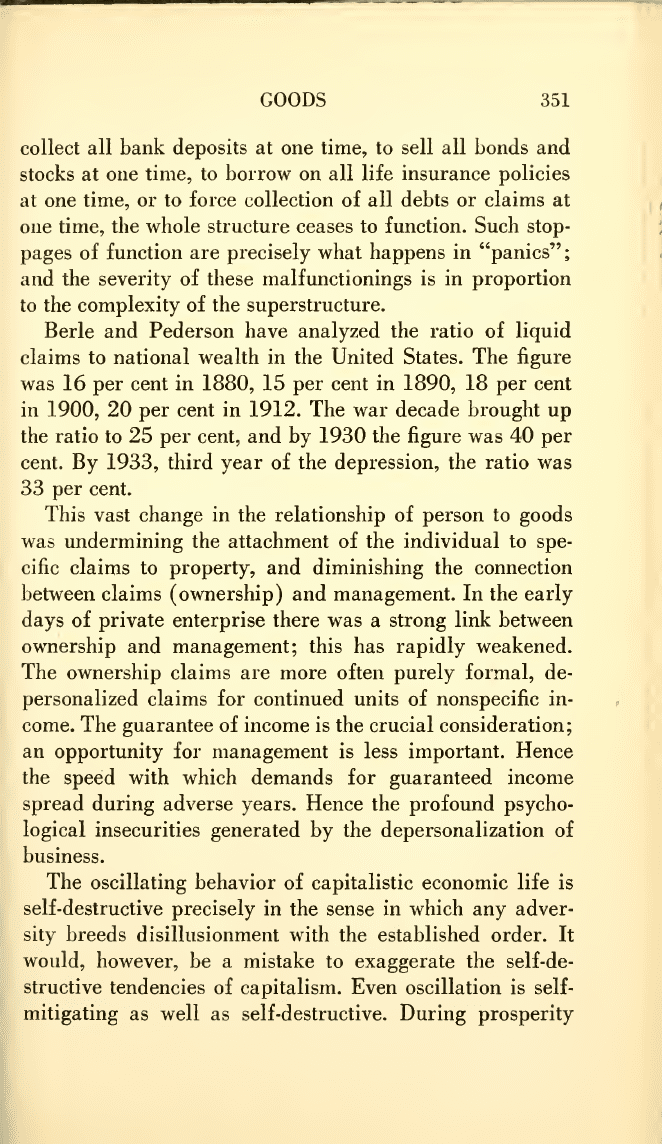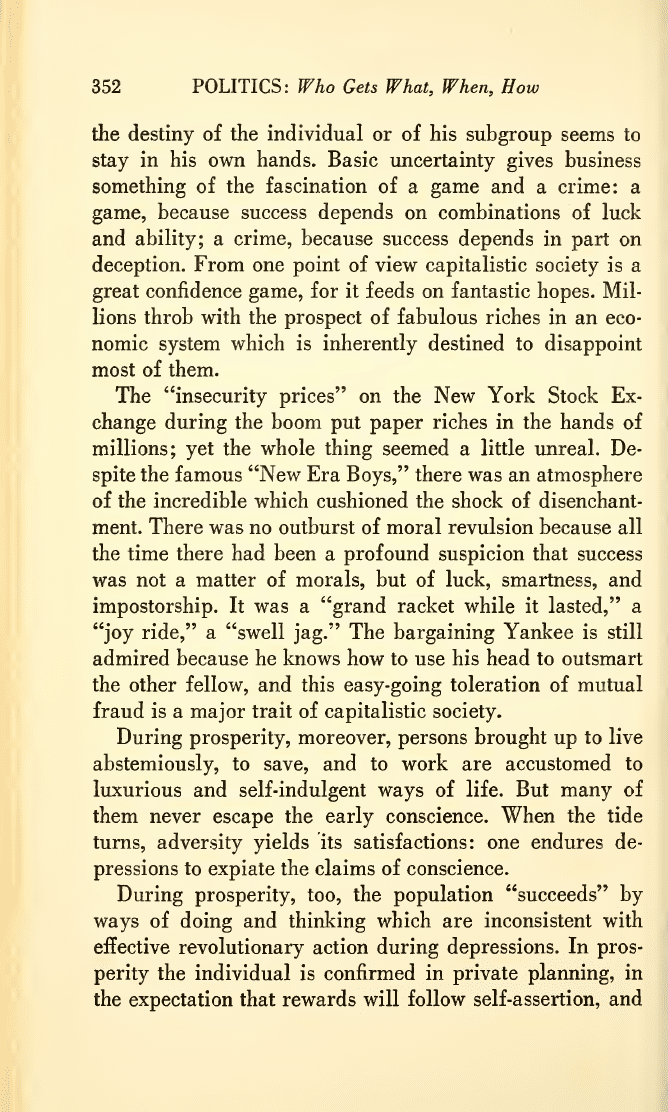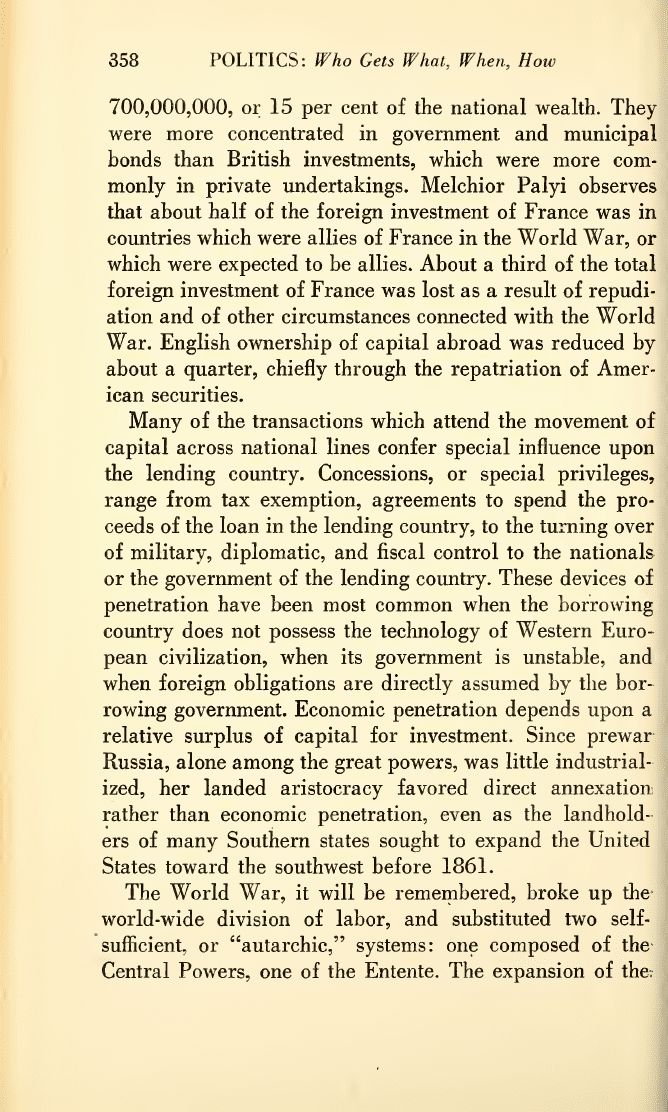Lasswell Harold D. The Political Writings of Harold D. Lasswell
Подождите немного. Документ загружается.


GOODS 351
collect
all bank deposits at one time, to sell all bonds and
stocks at
one time, to borrow on all life
insurance policies
at one
time,
or
to
force
collection of all
debts or claims
at
one time, the
whole structure ceases to function. Such stop-
pages of
function are precisely what happens in
"panics"
;
and the
severity of these malfunctionings is in
proportion
to the
complexity of the superstructure.
Berle
and Pederson have
analyzed
the ratio of
liquid
claims to national wealth in the United States. The
figure
was 16 per cent in
1880,
15 per cent in
1890,
18 per cent
in
1900,
20 per cent
in 1912. The war
decade
brought
up
the
ratio
to
25 per
cent, and by
1930 the figure was 40 per
cent. By
1933,
third
year
of
the depression, the ratio was
33
per
cent.
This
vast change
in
the
relationship
of
person to
goods
was undermining the
attachment of the
individual to
spe-
cific
claims to property, and
diminishing
the
connection
between claims (ownership) and management. In the
early
days of private enterprise there was a strong link between
ownership
and management; this has
rapidly weakened.
The ownership claims are
more often
purely formal,
de-
personalized
claims for
continued
units of
nonspecific
in-
come.
The
guarantee
of income is the crucial
consideration;
an
opportunity for
management
is
less important. Hence
the speed with
which demands for guaranteed
income
spread during adverse
years.
Hence
the profound psycho-
logical
insecurities generated
by the
depersonalization
of
business.
The oscillating
behavior of capitalistic economic life is
self-destructive precisely in
the sense
in which
any adver-
sity breeds
disillusionment
with the
established
order. It
would,
however, be a mistake
to
exaggerate the self-de-
structive
tendencies
of
capitalism. Even oscillation
is self-
mitigating
as well as self-destructive. During prosperity

352 POLITICS: Who Gets What, When,
How
the
destiny of the
individual
or of his subgroup
seems to
stay
in his own hands. Basic uncertainty
gives business
something of the fascination of
a
game
and
a
crime:
a
game, because success depends on combinations
of luck
and
ability;
a
crime,
because success depends in part
on
deception.
From one point
of
view capitalistic
society is
a
great confidence game, for it feeds on fantastic
hopes. Mil-
lions throb with the
prospect
of fabulous riches
in an eco-
nomic system which is
inherently
destined
to
disappoint
most of them.
The
"insecurity prices" on
the New
York
Stock
Ex-
change
during the boom put
paper
riches
in the hands of
millions;
yet
the whole thing seemed
a
little unreal.
De-
spite the famous "New Era Boys," there was an atmosphere
of
the incredible which cushioned the shock of disenchant-
ment. There was no outburst of moral revulsion because all
the time there had been
a
profound suspicion that success
was not a matter of
morals,
but of
luck, smartness,
and
impostorship.
It was a
"grand racket
while it lasted," a
"joy ride," a "swell jag." The bargaining
Yankee
is still
admired
because
he
knows
how to use
his
head to
outsmart
the other fellow, and this
easy-going toleration
of
mutual
fraud
is a
major trait
of
capitalistic society.
During prosperity, moreover, persons brought
up
to live
abstemiously, to
save,
and
to
work are accustomed to
luxurious and self-indulgent ways of life. But
many of
them never escape the early conscience. When
the tide
turns,
adversity yields its
satisfactions: one endures de-
pressions to expiate
the claims
of conscience.
During prosperity, too, the population "succeeds"
by
ways of doing and
thinking which are inconsistent with
effective revolutionary action during depressions.
In pros-
perity
the individual
is
confirmed in
private planning,
in
the
expectation that rewards will
follow self-assertion,
and

GOODS
353
in
individualistic
pride in personal responsibility. But mass
movements
depend on the identification of the
individual
with
collective symbols, collective
demands, collective
hopes.
Individualists persevere in
individualistic ways of
life
well into the
depression;
and
thus far capitalism
has
been
able to recover in
the major countries. Capitalistic
oscillation would seem to generate the
psychological
safe-
guards during its expansion
which preserve it during
collapse.
There
is
nothing
predetermined about
self-recovery,
however; and the proposals now
current for
the
protection
of the system are compelled to rely upon the motivations
and skills which can be recruited within the system
itself,
subject to all the entanglements of the
system.
Striking differences in the distribution of wealth and
income, prevalent in capitalistic countries, create constant
provocations to attack the system which permits them to
continue. Hence
the undertone of discontent in prosperity
and
the overtone of protest in adversity. It is possible to
separate,
for analytic
purposes,
the problem of stabilizing
capitalism
from the problem of
equalizing
incomes. But
it
is clear that
those
who
get the largest incomes usually
assume that
their vested
interests
are to sustain practices
whose objective result
is to
promote instability.
This is the
inner contradiction
in
the policies
of the plutocracy bred
by capitalism. Policies
of concession are clearly dictated
by long-run considerations;
but what are the intervening
steps
by which
a
sufficient concentration
of vested and sen-
timental
interest
may be
elicited?
To this question
we shall
return
from time
to
time in the
course of
this
book.
Since the ruling elite usually
has
the
goods at its
dis- \
posal, the
counter-elites which lead the masses
must
de- \
pend
more
on propaganda than on goods or
violence. The
\
potential
economic strength or fighting strength
of
the

354
POLITICS:
Who Gets What, When, How
masses
may
be
concentrated by patient
and
prolonged
propaganda.
To
some
extent control over goods is indispensable
to
any
revolution. But
until the actual seizure
of
power the
control
over goods
is
more important
in its symbolic, that
is to say,
its
propaganda, aspect
than
in its specifically
economic
aspect.
Withdrawal from
cooperation in consumption, produc-
tion,
and
other
collective activities has been
a
principal
weapon of the
disadvantaged. Sometimes the boycott
has
drawn attention to
conditions
which
aroused action favor-
able to the
disadvantaged. In 1920 the International
Trade
Union Federation at Amsterdam called for the
boycotting
of
Hungarian goods in
protest against
the repressive meas-
ures of the Himgarian
government
against labor. The re-
sult was to bring into the news of the world the previously
suppressed
reports
of how the "white terror" avenged itself
upon
those
who had
been connected with
the "red
terror."
In 1909 some support was won in America
for the Chinese
by means of
a
boycott by Chinese of American
goods. The
protest was directed against
the
alleged mistreatment
of
Chinese
in
America.
On some
occasions nationalistic sentiment
has been
ce-
mented
by
means of boycotts and strikes. In
1919 the
Chinese nationalists organized
a
boycott against the
award
of Tsingtao
to
Japan.
As
early as 1905 Indians
boycotted
British
goods and began to encourage domestic production.
Such widespread movements
of noncooperation as those
led by Gandhi in recent years could only occur
where the
practice
of noncooperation is deeply embedded
in the cul-
ture.
To this
day in India it is
a
recognized
procedure
for
a man
who has suffered wrong from his neighbor
to sit
down
before the latter's door and starve himself to
death.

GOODS
355
The
bare threat
is
usually sufficient
because if the victim
were to
perish, his
ghost would presumably
haunt the
wrongdoer.
At
certain times great
expectations have been
enter-
tained
of the effectiveness of the general
strike as
a
means
of
social revolution. But it seems to
be a weapon
of lim-
ited
utility. A general strike has occasionally
been
success-
ful
when launched by labor organizations
on behalf
of a
demand which was popular with
some
other
class
in the
community. In 1893 the Belgian general strike,
which was
enthusiastically hailed as
a
triumph of labor,
was for
the
extension of the
suffrage,
a
demand with which
the middle
classes were in sympathy. Other general strikes,
like that
of Sweden in
1909,
failed through lack
of support from
other
classes.
In fact, the more specifically
"proletarian"
the demands have been, the more social
formations
have
been
marshaled
for defensive action
against the
strike.
Hence a
general strike
must either
be a
brief
demonstra-
tion
strike, or
intensify
a
major revolutionary
crisis,
a re-
sort to violence,
a
seizure
of
power.
Such
was the unmis-
takable meaning of the general
strike
of
1926
in
Great
Britain. The striking unions were
confronted
by
the
gov-
ernment's cry of "civil war";
and technical
students
and
other volunteers did sufficiently well
operating
motor trucks
and
other
essential
services
to
prevent
extreme
disorganiza-
tion
of
vital supplies
for the community.
In 1917
the
gen-
eral
strike was
a
serviceable
weapon
at the height
of
the
crisis
in Moscow, although
it was superfluous
in
Petrograd.
In
1920 the Kapp Putsch in Berlin,
met
by a general
strike,
collapsed.
But the Kapp adventurers
were without
active
support in
the
community
at large.
Until an elite
has
been disintegrated
and
discredited
by
colossal
ground swells of insecurity,
born of
defeat
and

356
POLITICS:
Who Gets What, When, How
depression,
rationalized by spokesmen of new and rising
social
formations,
it is unassailable
by withdrawals from
cooperation,
like
strike
and boycott.
Plainly the
external position of
an
elite with
reference
to
rival
foreign elites is
gravely
affected by its control
over
commodities and services. Goods
are both
a measure
of
potential fighting
strength
and a
means
of
fighting
effec-
tiveness. One
means for the successful prosecution
of war
is the
management of goods to induce dissatisfaction among
enemy peoples, to win over allies, to preserve neutrals,
and to strengthen
internal morale.
In a crisis the resources
of the entire community
are
at stake
and
profit
from
a
unified emergency administration.
The Central Powers were slowly strangled
by
the
Allied
blockade during the World War. Blockade cut
down the
supply of rubber, tin, cotton, copper, lubricating oils,
and
fats.
The
deficit
was
only partly
made up by substitutes.
Oils from
the
distillation
of coal
were
substituted for
lubricating
oils of
petroleum origin,
and food and clothes
were constantly modified. But
progressive scarcity, like
creeping paralysis, undermined the
physical stamina and
the
morale of the population.
The extent
to which wealthy powers were able
to
aid
their allies
is shown
in
these figures:
Loans by Great
Britain
S
8,770,000,000
Loans
by France
2,817,000,000
Loans
by
United
States
9,523,000,000
Loans
by Germany
2,047,000,000
Total (others
added)
23,660,000,000
The control
over goods
is nearly
as important
in
the
inter-elite rivalries
of peace as of
war.
During the
seven-
teenth
and eighteenth centuries the theories
and
policies
connected
with mercantilism led to the imposition
of dis-

GOODS
357
criminatory
duties and
prohibitions
on the products of
bostile
countries. Peace treaties often included or were
accompanied
by
tariff agreements which provided
for the
abolishing
of
prohibitions, for the renunciation
of
duties,
md
sometimes
for most-favored-nation treatment. Friendly
powers were
bound
to
one another
by
preferential tariffs,
notably
in the case of the Methuen Treaty of 1703 between
England
and Portugal.
Jacob
Viner has
come
to the conclusion that
during
the
nineteenth century there
was less relation between tariff
policy
and diplomacy, although
tariffs continued to
be
used as
means of
pressure. One protracted series
of con-
Toversies
between Italy and
France ran from 1888
to
1899. Since the
World War the trend toward self-suffi-
ciency
has led
to the general
adoption
of
export and import
licensing
and quota or
contingent requirements. Discrimi-
nation may be
practiced in
administrative fact
even
in
contravention of legal duty by
means
of
arbitrary valua-
tions for
customs purposes, by
boycotting
goods of
foreign
Drigin
in government
purchases
and
contracts,
by
embar-
goes on
imports of
animal
or
vegetable products in
the
^uise
of
sanitary
regulations,
by
preferred transportation
rates for domestic
commodities, and
by
similar devices.
To some
extent considerations of fighting effectiveness
riave
regulated the flow of investment into foreign coun-
ties. Before the
World
War, however, British investments
abroad
were comparatively little
affected
by such consid-
erations. For 1914 these investments have been
valued
at
20 billion dollars, or
about one-fourth
of
the national
tvealth of Great
Britain, and constituted the largest bloc
of
the world's
export capital. Where the sense of interna-
tional insecurity
was
acute,
as
in France, calculations
of
fighting
effectiveness
influenced
the
distribution
of loans
abroad. In 1914 French
foreign investments totaled
$8,-

358
POLITICS: Who
Gets
What,
When, How
700,000,000,
or 15
per
cent of the
national wealth.
They
were
more concentrated
in government
and municipal
bonds than
British investments,
which were more com-
monly in private
midertakings.
Melchior Palyi
observes
that about half
of the foreign
investment of France was
in
countries which were
allies
of France
in the
World War,
or
which
were expected
to
be allies.
About
a
third
of
the total
foreign investment of France was
lost as a result of repudi-
ation and of other circumstances connected with the World
War.
English ownership
of
capital
abroad was reduced by
about
a
quarter, chiefly through the repatriation
of
Amer-
ican securities.
Many of the
transactions
which attend the movement of
capital across national lines confer
special
influence
upon
the
lending country. Concessions, or special privileges,
range from tax
exemption,
agreements to spend the pro-
ceeds of the loan
in
the
lending country,
to the
turning
over
of military,
diplomatic,
and
fiscal control
to
the nationals
or the government of the lending country. These devices of
penetration have been most common when the
borrowing
country does not possess the technology of
Western Euro-
pean civilization, when
its government is unstable, and
when foreign obligations
are directly assumed by the
bor-
rowing government. Economic penetration
depends
upon a
relative surplus
of
capital
for investment. Since prewar
Russia, alone among the
great powers, was little industrial-
ized,
her landed
aristocracy favored
direct annexation:
rather than economic penetration, even as
the landhold-
ers of many Southern states
sought to expand the
United
States
toward the southwest before
1861.
The World War, it will be
remembered, broke
up
the
world-wide division of labor, and
substituted two self-
sufficient, or "autarchic," systems: one composed
of
the
Central Powers, one of the
Entente, The expansion of
the.

GOODS
359
world
market
had
generated conflicts
which put
profit
seeking into
the background, and brought
considerations
of
fighting effectiveness to the fore. Hence the
quest for
invuhierability, each state seeking to attain economic
self-
sufficiency by controlling its own centers of
iron
and steel
and food production.
A
divided and
weakened
Europe re-
duced to some
extent
the
pressure on
less
commercialized
and
industrialized
peoples.
This favored the expansion
of
strong states far removed from Europe (like
Japan).
In-
stead of an expanding
world
economy there are now con-
geries of contracting local economies. Reduced standards
of living intensify insecurity;
greater insecurity
threatens
the traditional system, and
the elites which profit
by it.
Prolonged crisis imperils the dualistic system
of
private
and public hierarchies under capitalism. Big business
and
financial elites find themselves menaced by agitators
skilled in the management of the masses, and by milita-
rists stem
in
respect for glory, not profit.
Threatened from within
and
from without, the elites
of
a
given community resort to oscillating policies of
cen-
tralized, then decentralized control of essential goods and
services, rationing, then pricing, sometimes to induce,
sometimes to coerce, sometimes to divert. Challenging
elites, handicapped
by
the concentration of goods and
services in the hands of the established
elites,
practice
with-
drawals
of cooperation as
a
means of
heightening
the
will
to power
of the
disaffected.

CHAPTER V
PRACTICES
The ascendancy of any elite partially depends upon the
success
of the practices it
adopts. These
procedures
com-
prise all the ways by
which
elites
are recruited and trained,
all the
forms
observed
in policymaking and administra-
tion.
The
constitution,
written
or
unwritten,
embodies the
practices which are deemed most fundamental to the gov-
ernmental and the
social order. Constitutionalism is
a
spe-
cial attitude toward the efficacy of
written words, "a name,"
writes
Walton
H. Hamilton, "given to the trust which men
repose in
the
power
of
words engrossed on parchment to
keep
a
government in order."
Since practices
are
changeable
details within
a
changing
whole, an established elite can use
them
to
defend itself
by
catharsis, or by
readjustment. Catharsis, the harmless dis-
charge of
tension,
may be
fostered by such humble devices
as
the act of showing solicitude for the bereaved. The ruler
is wise to attend to the disasters of the
community, and
to
signify his prompt and earnest
sympathy
to
the survivors.
Whether quake,
flood,
hurricane, drought, or pestilence,
the
resulting insecurities are potentially dangerous to the
social order. Hence the
canker
of
resentment
must not be
permitted to
thrive
in
lonely sadness. Gestures
of
condo-
lence
plus bread are far more potent than bread alone. It
is safer to economize on bread than On condolence.
For
purposes
of defense by
catharsis and minor read-
justment an established order can rely upon the
rearrange-
ment of its own details.
During the nineteenth and
360
